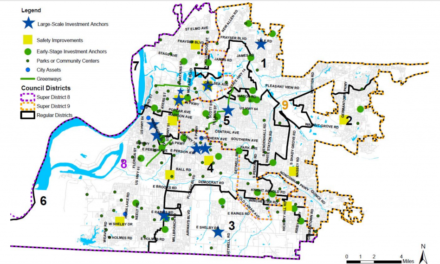
Memphis Zoo opened its Zambezi River Hippo Camp a few days ago, and we were reminded once again of the incredible transformation that the Memphis Zoological Society has led in turning a pleasant, well-loved local zoo into an important regional zoo with national aspirations.
The zoo’s evolution over the past two decades came from its stated focus on planning, smart design decisions, and customer experience. That’s what makes the abandonment of all of the same priorities when it came to parking simply incredulous.
It’s not possible to visit the Zambezi River Hippo Camp, or the zoo at large, without coming face-to-face with the dramatic dichotomy that exists between what was done by the zoo inside and outside the facility. To imagine that all of the improvements to the zoo were proposed and approved, money raised to pay for them, and the complex constructions completed without anyone discussing a long-range parking solution simply defies credulity.
The people on the Zoo board are some of Memphis’ leading and most successful citizens. Within their companies, it’s hard to imagine that if their staff had failed to raise a question so fundamental to their missions, they would still be employed. That’s why it’s so hard for most people to imagine that as more and more exhibits drawing more and more people were being discussed, parking was simply ignored.
Changing Times
Perhaps, board members simply assumed that the most popular heart of the park – the greensward – would always be a parking lot, but even accounting for changing attitudes toward parkland and the growing evidence of its importance in the economic success of cities, it’s unthinkable that no one at the zoo was imagining – or talking with City Hall – about what could be done to get cars off parkland.
There were early warnings that failed to get attention, such as increased numbers of park users drawn by the burgeoning fitness and outdoor recreation movement, and by concerts, art exhibits, and special events, all of which were accelerated by improvements by the Overton Park Conservancy turning the park into an even more cherished and valued civic amenity.
Meanwhile, it’s an indictment of City Hall thinking that over more than 20 years of new, grand zoo plans, no one in the mayor’s office got serious about how the pressure for more parking would be handled. It took new mayor, Jim Strickland, to set up a mediation process, which he reported last week is making progress toward a long-term resolution of these issues.
Hopefully, Memphis City Council can resist the impulse to inject itself again in an issue that requires diplomacy and open lines of communications rather than political haymakers aimed at giving the zoo the upper hand.
A Different Time And Place
Here’s the thing, the contract between City of Memphis, Memphis Park Commission, and Memphis Zoological Society was signed 27 years ago. It was signed on behalf of city government by Mayor Dick Hackett. In other words, it was signed for a different city and for a different time. Unfortunately, the Park Commission was eliminated during the administration of Mayor Willie W. Herenton and parks were at that point relegated to just another service in a long list of city services and without the advocates that had created one of the best park systems in the country.
If the Park Commission had continued to exist, its track record would suggest that it would have identified parking as an issue requiring serious thought and decisions. That said, it already appears that the tone is changing with some members of the Council who are asking more questions about the contract with the zoo, respective responsibilities, and why zoo funding has climbed at a time when lack of funding resulted in declining condition of other public buildings such as community centers.
The zoo does appear to have gotten special attention in city budgets over the past decade. Generally speaking, nonprofit organizations that have taken over management of city assets – think Riverfront Development Corporation, Memphis Botanic Garden Foundation, and Memphis Brooks Museum of Art Inc. – enter into contracts that guarantee city funding at the same level that existed when the agreement was signed.
As a result, the level of city funding for these management organizations remains roughly the same (although some have actually been reduced). It is a curiosity of zoo funding that it is 62% higher today than it was 10 years ago.
It’s Not PR, It’s Policy
Even more curious is that the amount the zoo received each year exceeded the amount in the City Council-approved budget. We’re not suggesting anything diabolical and assume there are logical explanations, but when it happens every year for a decade, it can’t be considered an anomaly.
Meanwhile, the zoo once again misreads the parking on parkland controversy, and because of it, it’s treating it as a public relations war rather than about a community reaching the wisest policy decision about the highest and best use of publicly-owned parkland.
Zoo officials appear to be confused about the 1988 Overton Park Master plan adopted by the Park Commission, which superseded the zoo’s 1986 master plan that receives so much reliance. The 1988 plan stated that overflow parking would take place on Prentiss Place, not on the Greensward. The confusion results in the idea propagated by the zoo that it is now being asked to give up some right, when the fact is that it never possessed it in the first place.
The following are the actual funding amounts over the past 10 years. The total operating funding for the zoo totals $28 million and the capital improvement funding totals $7.5 million.
Operating Budgets
10-Year Total: $28,048,893
2017 – $3,552,637 (proposed)
2016 – $3,326,420 (forecast)
2015 – $3,762,484
2014 – $3,913,666
2013 – $2,690,639
2012 – $2,199,278
2011 – $2,337,305
2010 – $2,127,000
2009 – $1,943,536
2008 – $2,195,928
Capital Improvements Budget
10-Year Total: $7,500,000
2017 – $250,000
2016 – $250,000
2015 – $250,000
2014 – $250,000
2013 – $250,000
2012 – $250,000
2011 – $250,000
2010 – $2,750,000
2009 – $2,750,000
2008 – $250,000
***
Join us at the Smart City Memphis Facebook page for daily articles, reports, and commentaries relevant to Memphis.





Thank you for providing accurate, balanced information about the zoo and the parking.
As a patron of the Levitt Shell and zoo, and a supporter of MCA, I believe it is imperative that the City continue the work they are doing to balance out our gifts in a manner that create a favorable venue for more people.
I applaud the mayor and the leadership at the zoo for recognizing that these many gems can all be beautifully set in the same ring.
Great article, anyone who reads it should not have any doubt about what the Zoo thinks of Overton Park. I hope everyone will remember that the Zoo has never really committed to getting off the Greensward.
The recent parking additions that Mayor Strickland announced were not new, but recycled Mayor Wharton suggestions which the Zoo rejected a year or more ago. So as of today we have parking proposals to increase the Zoo’s parking capacity, Mayor Strickland’s fence across one third of the Greensward every weekend and absolutely no commitment from the Zoo to get off the Greensward. You even have Strickland’s supporters saying we can live with the fence. Oh yes and it gets better! We have Reid Hedgepeth’s resolution that gives the Zoo an option for the entire Greensward anytime they want. Wow, does it get any better for the Zoo?
Mediation will get us nothing but more parking for the Zoo and the loss of one third or more of the Greensward. You have to mediate in good faith, there is no good faith at the Zoo. I would dare anyone to ask where the 27 trees the Zoo pulled up around the Greensward are located. Remember, the Zoo spokesperson went on and on about how they are safely inside the Zoo, no there not, they went into a dumpster. By the way those trees were uprooted to provide a 2nd car ingress egress to the Greensward, which is now installed.
I hope history proves me wrong and we get the Greensward back, the 27 trees are happy in their little pots being nurtured by the Zoo and the Zoo’s gravel road and 2nd entrance into the Greensward are taken up forever.
Thanks again for a great article that helps tear down the myth of the Zoo one fact at a time. We will get there, but the fight has only just begun.